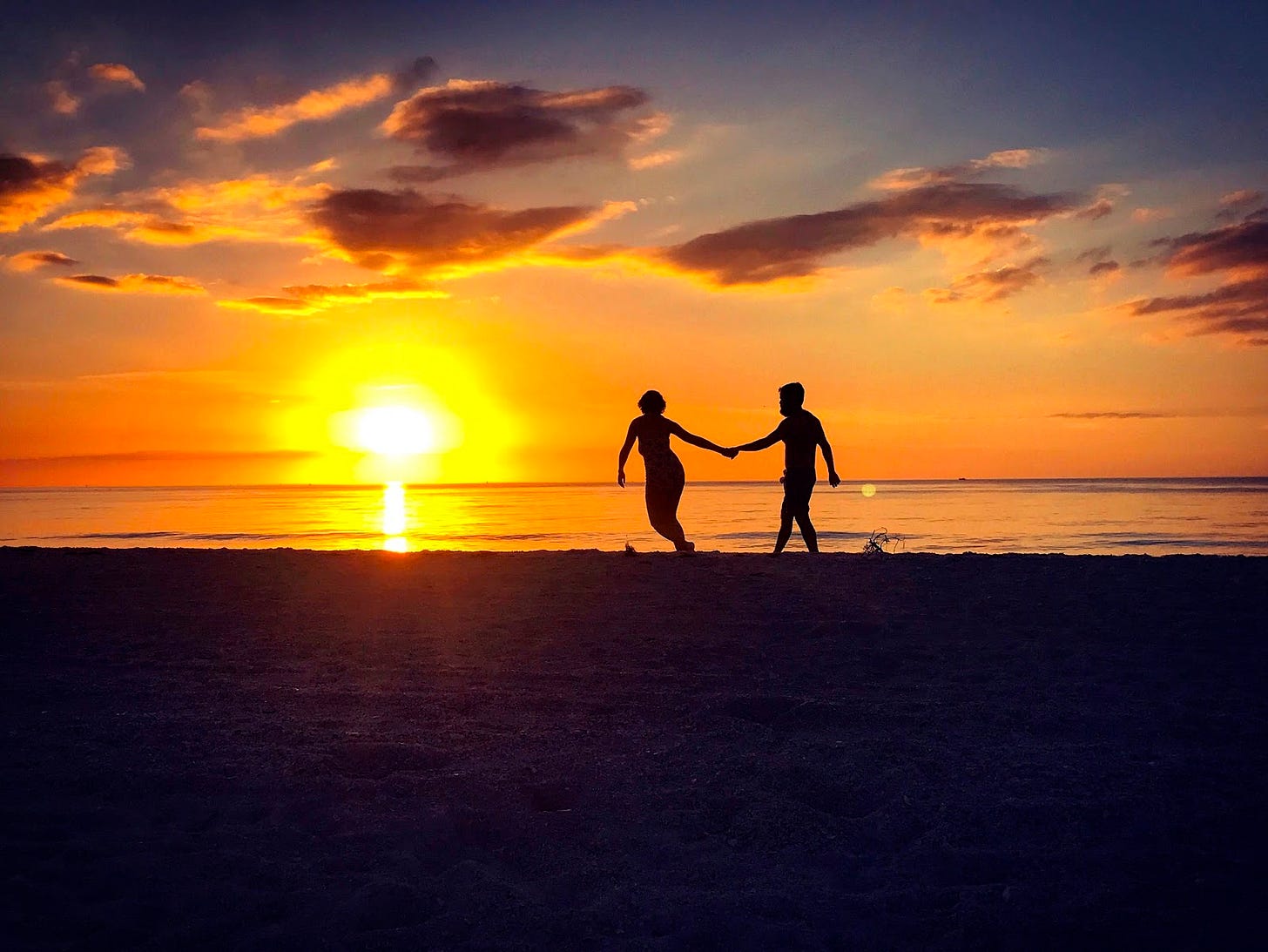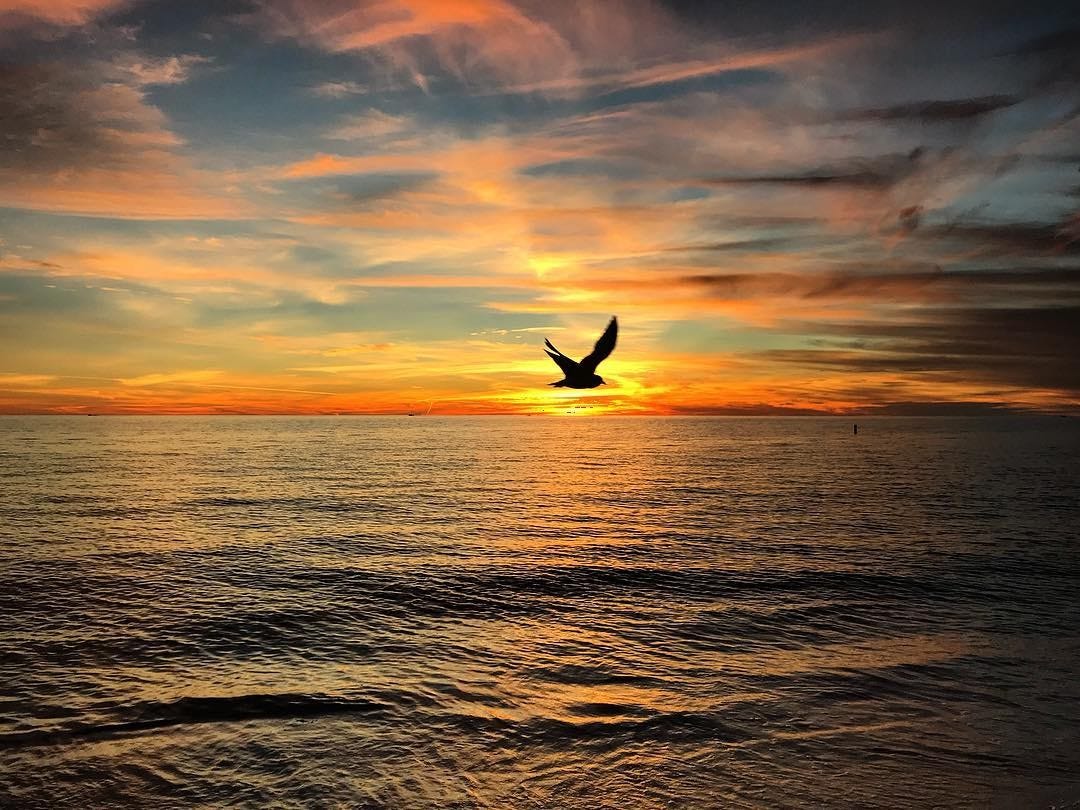The fragility of it all
Our lives and libraries won’t last forever.
The last time I locked eyes with my husband was on February 4, 2017—three years ago, today. Jamie had reached the ninth mile of a 13.1-mile race. I shouted and cheered from the sidelines; he returned a tired smile and wave as he continued running. The next time I saw him, somewhere past mile 12, he was dead.
I didn’t know then that Jamie had died. All I knew was that he was lying on the pavement, unresponsive, surrounded by medical staff. I remember being unexpectedly calm during the ambulance ride to the hospital. I took measured breaths, dutifully replied to the driver’s attempts at small talk, and repeated silent prayers. I told myself, If I stay calm, that means the worst won’t happen.
But the worst did happen. The official time of death, as called by the emergency room doctor, was 10:12 a.m. The official cause of death, something we didn’t learn until months later, was fibromuscular dysplasia of atrioventricular node arteries—a rare and, in Jamie’s case, undiagnosed cause of sudden cardiac failure. He was 32 years old.

Life is really, really, ridiculously, annoyingly, infuriatingly, terrifyingly fragile. Just two weeks before Jamie died, we were at the beach, enjoying a beautiful sunset that a friend thankfully documented. Four days before his death, we sent video footage of ourselves to the adoption agency we were working with, in hopes of becoming a family of three. Hours before that fateful moment, we coordinated our morning plans: I’d cheer him on in the middle of the race, and we’d meet at the finish; afterward, we’d celebrate a successful half marathon at a nearby brewery with friends.
It all fell apart, in one horrible instant. Jamie crossed an entirely different finish line that day.
The fragility of life is hard to face. We tend to look away from it, because the alternative is far too difficult. If we consider the fact that we will die—and can die at any moment—it makes us question the point of it all. Why do we make promises and plans for the future? Why do we learn new skills and take on jobs and fill our homes with so much stuff? Why do we bother making the right choice, the safe choice, the long-term choice? Why do we allow ourselves to love?
This, I believe, is why Kobe Bryant’s recent passing is so difficult for us to confront—no matter how you feel about his legacy. As Conor Friedersdorf wrote in The Atlantic, “We knew his public persona, watched him impose his will on other superstar athletes, and can’t help but feel our own mortality at the confirmation that neither once-in-a-generation talent nor work ethic nor money nor fame nor indomitable will can spare us from death. If he couldn’t protect himself or his kid from life’s tragic fragility and unpredictability, how can we?”
Or as Jill Filipovic put it: “It’s a terrible, heartbreaking tragedy, another reminder that even those who seem iconic are not invincible.”
I think celebrity deaths also remind us of what we haven’t yet accomplished in our lives—and may never will. Jamie wanted to be a screenwriter and film director, and, as a devoted fan of movies and television, he mourned plenty of high-profile deaths over the years. One of the losses that deeply affected him was that of comedian and television writer Harris Wittels, who, on February 19, 2015, died at 30 years old.
That day, Jamie wrote a journal entry about how much Wittels’ death impacted him. He reflected on how Wittels had lived his own personal dream: Being funny, and getting paid for it. Seeing so many of his favorite comedians “sad, remembering their young, talented, dead friend,” Jamie admitted that he felt jealous. (“How low is that?” he added, with embarrassed honesty.) He explained that Wittels’ fatal overdose, which came days after a high school classmate’s death, felt like a wakeup call.
“I could be dead like [my classmate] or Harris—just like that,” Jamie wrote. “Shouldn’t I get up and run and scream, and be the biggest, loudest, funniest person out there if we’re all just gonna die? Probably.”
I discovered Jamie’s journal not long after his death. I vividly remember first reading those words; they felt so eerie and prescient. Almost exactly two years after he wrote that entry, Jamie did die—just like that.
I’ve revisited Jamie’s thoughts many times since then. Sometimes, I reread that journal entry and feel devastated. Lately, though, it gives me some encouragement. Jamie, whether or not he saw it, was the biggest, loudest, funniest person that I and many others knew. He did seize life, running and screaming, laughing and making others laugh along the way. He became the young, talented friend who was, and still is, mourned by countless people.
In the end, he lived his life like he aimed to. To me, that feels like the ultimate achievement.

A unique thing about celebrity deaths is how they compel collective mourning. As any grieving person can tell you, it’s an unsettling and isolating experience to mourn a loved one privately while also interacting with the outside world, which remains unaffected by the loss. But when a celebrity dies, especially someone famous who was young, we are simultaneously reminded how ephemeral life really is. If even for a fleeting moment, we’re all on the same page, remembering what really matters.
In the days and months after Jamie died, I walked around like a zombie—seeing the world in a way I never had before. If I did have the energy to go outside, I’d shuffle through the same circular path in my neighborhood, looking at houses and wondering about the people who lived in them. I’d see curtains in windows, mailboxes with painted letters, children’s bicycles on lawns, and wonder why we collect so many things and create such elaborate existences if it can all end in an instant.
It’s a scary thing to consider—not so much death, as the sum of life. Does it even matter? What is the point? And when it’s over, is that it?
The night before I started this essay, I read a passage of Susan Orlean’s The Library Book, which was exactly the comfort I needed as the anniversary of Jamie’s death inched ever closer.
The idea of being forgotten is terrifying. I fear not just that I, personally, will be forgotten, but that we are all doomed to being forgotten—that the sum of life is ultimately nothing; that we experience joy and disappointment and aches and delights and loss, make our little mark on the world, and then we vanish, and the mark is erased, and it is as if we never existed. If you gaze into that bleakness even for a moment, the sum of life becomes null and void, because if nothing lasts, nothing matters. It means that everything we experience unfolds without a pattern, and life is just a wild, random, baffling occurrence, a scattering of notes with no melody. But if something you learn or observe or imagine can be set down and saved, and if you see your life reflected in previous lives, and can imagine it reflected in subsequent ones, you can begin to discover order and harmony. You know that you are part of a larger story that has shape and purpose—a tangible, familiar past and a constantly refreshed future. We are all whispering in a tin can on a string, but we are heard, so we whisper the message into the next tin can and the next string. Writing a book, just like building a library, is an act of sheer defiance. It is a declaration that you believe in the persistence of memory.
Jamie never wrote a book, but he left behind several journals and screenplays, heartfelt letters and texts to friends. He gave us comedy sketches and jokes and stories that are still shared to this day. He lived a full life—one that is over, but one that held endless memories that still continue on.
Orlean wrote that, in Senegal, there’s an expression that’s used when someone dies: his or her library has burned. It’s a beautiful metaphor. As Orlean explained, “Our minds and souls contain volumes inscribed by our experiences and emotions; each individual’s consciousness is a collection of memories we’ve catalogued and stored inside us, a private library of a life lived. It is something that no one else can entirely share, one that burns down and disappears when we die. But if you can take something from that internal collection and share it—with one person or with the larger world, on the page or in a story recited—it takes a life of its own.”
It brings me deep comfort to keep Jamie’s story alive. His library might be gone, but I am fortunate to carry volumes of memories from our time together. For at least a year after Jamie’s death, I thought my sole purpose was to honor those memories. Now, I realize I can share his story while also transforming my own. My library is shifting every day, and with every new essay I write and unique experience I have, it gets a little bigger. I know now, better than I ever did before, how impermanent my library is; which is to say that I am immensely grateful for it all.
I can’t possibly know when my library will burn, nor can you. What I do know is what I learned from Jamie’s catalogue of stories—that I should never waste an opportunity to get up and run and scream, to be the most authentic version of myself that I can be.
I love you, Jamie. Thank you for entrusting me with so many memories.
xoxo,
KHG
p.s. What’s brought you comfort whenever you’ve considered the fragility of life? Is there a song or poem or advice from a friend that’s helped you? Respond to this email and let me know. I’ll share some of your responses in Thursday’s subscriber-only newsletter.
I’m an open book
Speaking of libraries, I have a whole archive of My Sweet Dumb Brain essays I've written over the past year and a half. If you’re new here, I don't always talk about death (though grief is something I discuss often!). Past essays cover topics such as habit-formation, dealing with anxiety and negative self-talk, and little ways to imbue joyful vibes into your living space. Mostly, I write about navigating the ups and downs of this sweet dumb life we're all experiencing together.
I hope that my little library will spark some introspection and reflection in your own life. If it does, please consider sharing some of my essays with a friend or loved one, or clicking the heart icon in this post. It all helps!
This newsletter is written by Katie Hawkins-Gaar. It’s edited by Rebecca Coates, who’s also a keeper of Jamie’s stories. Her favorite volume contains nights of too much beer and competitive board games, over-analyzing every detail of LOST, and coming up with endless puns.



I'm so honored and privileged to share in your library. And Jamie's.
My life is better for having had the Hawkins-Gaars in it. ❤️
Crying in the library — again. Sending you love.